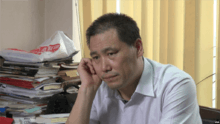Pu Zhiqiang
| Pu Zhiqiang 浦志强 | |
|---|---|
 | |
| Born | 1965 |
| Nationality | Chinese |
| Occupation | Attorney |
| Known for | Civil rights advocacy |
| Pu Zhiqiang | |||||||
| Chinese | 浦志强 | ||||||
|---|---|---|---|---|---|---|---|
| |||||||
Pu Zhiqiang is a civil rights lawyer in the People's Republic of China specializing in press freedom, defamation, and product safety, among other issues.[2][3] Based in Beijing, he is an executive partner of Beijing Huayi Law Firm,[4] Pu is a prominent figure in the Weiquan movement, having advocated for writers and journalists in a number of high-profile cases.[4] Due to the nature of his cases and his outspoken criticisms of official policies, Pu is monitored by security forces, and has been detained and questioned on several occasions.[5][6]
Biography
Pu Zhiqiang received his Bachelor degree in History from Nankai University in 1986, and LL.M. degree from China University of Political Science and Law in 1991. When he was a graduate student, he joined the pro-democracy movement in 1989.[7] Writing for the New York Review of Books, Pu described how he returns to the square annually with friends and family to mark the anniversary of the crackdown in fulfillment of a promise he made in 1989.[5]
Advocacy
| Weiquan Lawyers |
|---|
|
Background
|
|
Lawyers and legal scholars
|
|
Organizations
|
|
Cases and Events
|
Pu has been involved in a number of high-profile freedom of speech cases, defending dissident writers and journalists. In 2004, he defended writers Chen Guidi and Wu Chuntao. The couple was facing libel charges for their portrayals of Zhang Xide, a local Communist Party official, in their best-selling book A Survey of the Chinese Peasants. The case—and Pu's litigation in court—garnered international attention. Philip Pan of the Washington Post wrote that "by the time [Pu] finished his cross-examination, the mood in the courtroom had begun to change. When the trial ended three days later, ... it seemed as if Zhang – and the Communist Party itself – were the ones on trial."[7]
The same year, Pu won a landmark victory on behalf of the China Reform Magazine, which was similarly facing libel charges for its critical reporting on a real estate developer. The court decided in the magazine's favor, ruling that journalists are entitled to legal immunity on the condition that their stories are based on a reasonably believable source, rather than hearsay or fabrication.[4]
In 2006, Pu represented dissident writer Wang Tiancheng, who charged that a legal professor, Zhou Yezhong, had plagiarized over 5,000 words of Wang's writings without attribution. Although the court recognized that plagiarism had occurred, it ultimately ruled that the copied material represented too small a portion of the Zhou's book. Pu told the South China Morning Post that he believed the court's decision may have been politically motivated.[8]
In 2012, Pu was one of three lawyers defending dissident blogger Fang Hong. Fang had been sent to one year in a labor camp for writing a poem mocking former Chongqing Communist Party chief Bo Xilai. Following Bo's fall from power, Fang filed to have his guilty verdict overturned, and sought compensation from the court.[9]
Notes
- ↑ Profile of Pu Zhiqiang, Candidate for 2007 Young Leaders, Nanfang People Weekly, 18 April 2007.
- ↑ John Kennedy, China: Book banned prior to printing, Global Voices Online, 21 March 2007.
- ↑ New York Review of Books, Contributors: Pu Zhiqiang.
- ↑ 4.0 4.1 4.2 University of Hong Kong, China Media Project, Fellows: Pu Zhiqiang.
- ↑ 5.0 5.1 Pu Zhiqiang, ‘June Fourth’ Seventeen Years Later: How I Kept a Promise, New York Review of Books, 3 June 2006.
- ↑ William J. Dobson, The World’s Toughest Job: Try being a human rights lawyer in China, Slate magazine, 6 June 2012.
- ↑ 7.0 7.1 Philip P. Pan, In China, Turning the Law Into the People's Protector, Washington Post A01, 28 December 2004.
- ↑ Vivian Wu, "Dissident writer loses 'political' copyright case," South China Morning Post, 22 December 2006.
- ↑ ISOLDA MORILLO and CHRISTOPHER BODEEN, China blogger seeking redress over labor camp term, Associated Press, 8 May 2012.